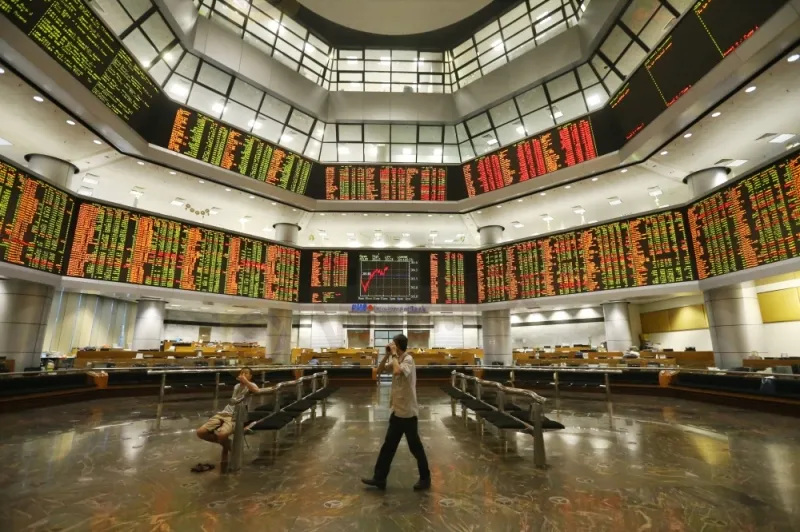简体中文
繁體中文
English
Pусский
日本語
ภาษาไทย
Tiếng Việt
Bahasa Indonesia
Español
हिन्दी
Filippiiniläinen
Français
Deutsch
Português
Türkçe
한국어
العربية
Bursa Malaysia opens lower due to profit taking
Abstract:The broader market experienced a negative trend with decliners outnumbering advancers at 147 to 126. Additionally, 260 counters remained unchanged, 1,732 were untraded, and 17 others were suspended.

KUALA LUMPUR, August 2 — Bursa Malaysia started the day on a lower note as investors continued profit-taking, influenced by Wall Street's mixed performance in the previous session.
As of 9.10am, the FTSE Bursa Malaysia KLCI (FBM KLCI) declined by 2.99 points to 1,448.25 from Tuesday's closing level of 1,451.24.
The main index started the day with a decline of 1.79 points at 1,449.45.
In the broader market, decliners outnumbered advancers with a ratio of 147 to 126, while 260 counters remained unchanged, 1,732 were untraded, and 17 others were suspended.
The total turnover amounted to 203.32 million units valued at RM89.52 million.
Malacca Securities Sdn Bhd reported that Wall Street concluded with a mixed performance, as the Dow Jones Index recorded a modest 0.2 percent gain, while the S&P 500 and Nasdaq declined by 0.3 percent and 0.4 percent, respectively. This outcome was attributed to the varied results of corporate earnings.
In Malaysia, the S&P Global Malaysia Manufacturing PMI for July 2023 recorded a reading of 47.8, indicating a continued slowdown in business conditions with a recovery in demand still some distance away.
Despite the challenging conditions, analysts view the current pullback as a healthy correction, allowing the market to digest recent gains.
Furthermore, the lower liners in the market are undergoing a consolidation phase as traders adopt a cautious approach and adopt a wait-and-see stance ahead of the state election, according to the brokerage's note.
Regarding sector performance, defensive sectors like healthcare, utilities, and REITs may come into focus amid emerging signs of volatility. On the other hand, the technology sector may mirror the weakness seen in the Nasdaq overnight.
Among the heavyweight stocks, Maybank declined four sen to RM8.95, CIMB fell five sen to RM5.47, Tenaga Nasional slid two sen to RM9.53, and Petronas Chemicals decreased six sen to RM6.79. Meanwhile, Public Bank remained unchanged at RM4.12.
In terms of active stocks, Revenue, Advance Synergy, and Widad each saw an increase of half-a-sen to 26.5 sen, 16.5 sen, and 43 sen, respectively. Tanco and its warrants remained unchanged at 54.5 sen and 22.5 sen, respectively.
On the index board, there were declines observed in several indices: the FBM Emas Index dropped 18.74 points to 10,639.83, the FBMT 100 Index decreased 18.74 points to 10,333.71, the FBM Emas Shariah Index weakened 15.20 points to 10,907.59, the FBM ACE Index eased 13.65 points to 5,293.76, and the FBM 70 Index declined 14.43 points to 13,956.78.
In terms of sectors, the Plantation Index saw a decline of 6.20 points to 7,138.21, the Industrial Products and Services Index reduced by 0.43 of a point to 167.14, and the Financial Services Index slid by 47.52 points to 16,144.74. However, the Energy Index showed a slight increase of 4.64 points to 837.75.

Disclaimer:
The views in this article only represent the author's personal views, and do not constitute investment advice on this platform. This platform does not guarantee the accuracy, completeness and timeliness of the information in the article, and will not be liable for any loss caused by the use of or reliance on the information in the article.
Read more

Why Is UK Inflation Rising Again Despite Recent Lows?
October inflation rises to 2.3%, driven by energy costs. Renters face 8% annual hikes, while house price inflation climbs. Interest rates stay elevated.

Revolut to Expand UK Stock Trading Services in 2025
Revolut will launch UK and EU stock trading in 2025, challenging major brokers. Learn how this fintech disruptor aims to reshape retail investing.

Will Trump’s Second Term Drive Economic Growth Through Tax Cuts?
Donald Trump’s second term may bring economic boosts with plans for tax cuts, deregulation, and crypto policies, impacting banks and various sectors worldwide.

Morgan Stanley Gains Approval to Launch Futures Business in China
Morgan Stanley secures regulatory approval to enter China's futures market, expanding its presence and joining J.P. Morgan in the rapidly growing derivatives sector.
WikiFX Broker
Latest News
Saxo & Portuguese Bank Partnership
SEC Fines Broker-Dealers $275K for Incomplete SAR Filings
Elon Musk Warns of Imminent US Bankruptcy | Bitcoin Retreats from $100K
UK FCA Fines Barclays £40 Million Over 2008 Deal
WikiEXPO Global Expert Interview: Advanced Practices and Insights in Financial Regulation
Justin Sun Invests $30M in Trump-Backed World Liberty Financial
Lured by False Promises: Malaysian Driver Lost RM218K to an Investment Scam
FTX Sets March 2025 Timeline for Creditor Payouts: What It Means for Investors
What is an Economic Calendar? How it works
Pros & Cons of Automated Forex Trading
Currency Calculator


